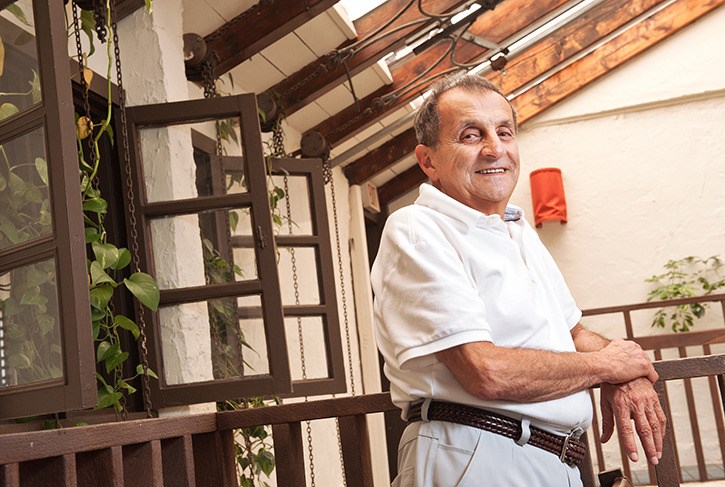It wasnt so much of an epiphany as a directive from his family: instead of selling food that he thought other people wanted to eat, Victor Bouzide should sell the food he loved to eat.
He sold his pizza chain and opened La Mishwi, using his mothers Lebanese recipes. But not many people in his hometown of Windsor, Ontario, wanted to have mjadra, baba ghoonij and lamb hushwie for lunch. The university professors who came to the cafe told him that if he took the concept to Vancouver, it would be a winner.
And so, at 61, he convinced his wife Carol to move across the country. With more optimism than cash, he started a company called Sans Souci (without a worry in French) and sold homemade hummus to grocery stores. To build the brand, however, he knew he needed to introduce people to the chick pea dip that is now so ubiquitous its hard to imagine a time when it wasnt every hosts go-to offering.
In January 2003, he opened a little 15-seat space on Hastings at Hamilton. (Part of the reason why he chose the name Nuba, which has Arabic roots, is that the Lebanese war was raging and he didnt want a Lebanese name. Besides, it was easier to have just four letters to paint on the sign.)
Back then, the neighbourhood was a long way from where it is today in terms of popularity. Everyone who came in just wanted chicken. Chicken, chicken, chicken. He needed to convince people to venture further afield in their culinary journey. Id put down a dish of cauliflower and say, Try this. You eat this food, youll never see a doctor again.
Today, as the co-owner of four Nuba restaurants, Bouzide goes through 15 to 20 cases of cauliflower a day. Gently spiced and quickly deep-fried, drizzle the cauliflower with lemon or dip it in baba ghoonij and you have one of the most popular dishes on the menu, Najibs Special, named after his father.
That little space on Hastings? Its now La Taqueria and Nuba is downstairs at Hastings and Cambie, where on a recent Friday night, the tables turned over five times each.
Theres still a hole-in-the-wall Nuba, but its on Seymour. The bustling Nuba at 3rd and Main is also the site of the 5,700-sq.ft. commissary kitchen, which prepares much of the food that is delivered to the restaurants in the morning. (Bouzide boasts that there are three things youll never find in a Nuba kitchen: a can opener, since everythings made from scratch, a microwave, or an aluminum pot.) The newest location, the multi-storied Broadway restaurant with its light-filled, Mediterranean-inspired decor, just added Sunday brunch concerts with three Vancouver Symphony Orchestra musicians. Bouzide and his business partner, Ernesto Gomez, who joined him in 2007 before moving Nuba to the bottom of Cambie, are working on a cookbook.
Bouzides work ethic was both born out of circumstance and embedded in his genes. His familys story is one of survival, from the ancestors who lived in the mountains of what is now Lebanon and found creative ways to cook with chick peas and fava beans, to his own childhood during the Depression.
As a child, his mothers mother left Lebanon in 1893 and moved to Cuba. Her parents died in the bubonic plague that hit the country and, orphaned, she moved to Mexico to live with a relative, which is why youll find Mexican influences in some of Nubas dishes. She made her way to Chicago, where she cooked Lebanese food at the Worlds Fair, before returning to Lebanon. Once again, however, she had to flee religious conflict they were Christians at a time when the region was under the control of the Ottoman Empire, which was Muslim. Her daughter, Victors mother, was born in Cape Town, South Africa.
Victors father was born into a Christian family in Lebanon and was taken prisoner by soldiers during one of the many conflicts. He escaped in 1911 and eventually made his way to America. He met his wife at a Catholic shrine in Ohio and they ended up in Windsor. Its bizarre but its reality, Bouzide says of the complex maze that is his familys history.
Victor was born in 1936, the middle child of seven. They were tough years, not only for immigrants. Even when they were in public school, the children were expected to work. Their father woke up at four every morning and drove to surrounding farms to pick up fruits and vegetables. Hed bring them home and when the kids came home from lunch, hed nap while they unloaded the truck. Needing to help his family, Victor never went to high school. He sold pizza at the first restaurant he ever owned but didnt like eating there; hed go home to his mothers instead.
Bouzides father retired when they put him in the ground. He was 100. It can therefore be expected that Bouzide, whos still out at six every morning to buy the freshest produce, will be at it for a few more years. They have 115 staff members, most of whom were customers at Nuba before they worked there. Bouzides made it his mission to educate people about the health benefits of Lebanese cuisine, turning local school kids on to eating cauliflower and working with the St. Pauls Hospital heart health program to encourage heart-healthy menu choices.
In 300 years, he says, Burger King will be long gone but this [Nuba cuisine] will be here, just like it was here 300 years ago.



